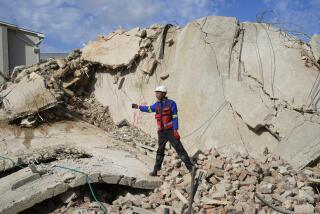Deadly cave-in could be black eye for Beijing
- Share via
BEIJING — The accident happened in China’s information capital, on a new subway line being built for the 2008 Beijing Olympics.
But it took rescue workers at least eight hours last week to arrive on the scene where six migrant workers were trapped in a tunnel collapse. There were no survivors.
The cave-in and delayed rescue Wednesday have the potential to seriously embarrass the Chinese government. Ten people overseeing the project have been arrested in connection with the accident, which is still under investigation.
Construction- and industrial-related accidents, particularly in mines, are legion in China. But they tend to happen in remote provinces and rarely receive widespread attention. This one played out publicly under the eyes of the highest officials in the land, who have vowed to crack down on negligence.
Relatives of the victims say fellow workers who wanted to call for help could not. Their bosses had sealed off the construction site, confiscated cellphones and told workers not to call police or the media.
When somebody finally got a line, he reached out to the only people he trusted: relatives in his hometown, about 400 miles away.
In Henan province, Li Shuangxi picked up the phone and learned that his 20-year-old nephew was among the victims.
He called the police. The Henan police.
“For three hours I was on the phone trying to explain what happened,” Li said in an interview.
At first the local authorities suspected a crank call. Why was an accident in Beijing not being reported to police in Beijing? Why didn’t the police in Beijing have a clue what this caller was talking about?
“It was obvious to me,” Li said. “There was a cover-up going on.”
By the time the Henan authorities called their counterparts in Beijing, who then launched the emergency rescue, eight hours had passed, dashing hopes of finding anyone alive.
Image-conscious Beijing has been calling for more accountability and transparency, especially regarding anything connected to the Olympic Games.
The communist leaders learned a lesson from the 2003 SARS epidemic.
The government initially tried to cover up the outbreak, which cost precious containment time and tarnished the country’s reputation.
“If nothing else, this should serve as a wake-up call to raise the safety standards not only of Olympic-related projects but all building projects in China,” said Li Jinsong, a Beijing lawyer.
Four bodies had been found by Monday, authorities said. The remaining two were under rubble too unstable to reach.
Until the accident, Beijing residents rarely paid much attention to the anonymous migrant workers who are remaking their skylines and underground arteries.
Over the weekend, however, some placed flowers near the station where the accident occurred, in the northwest part of the city known as China’s Silicon Valley. The area is also the gateway to Beijing’s university district.
“I don’t know how long these flowers will last, but I sincerely hope people would start to pay more attention to these migrant workers,” a college student told the Beijing News.
Five of the victims were from Sichuan province; three were from a single family, according to state media.
The youngest, Zhou Jie, was 18, those reports said. He had left his impoverished family in August to work beside an uncle, Zhou Yongquan, 37, and another relative, Zhou Congyun. All three died in the accident.
Zhou Yongfu, the labor contractor who recruited Jie and about a dozen others from their hometown, was also one of Jie’s uncles. Authorities say he is on the run.
Two other victims, Mu Chaoqing and Liao Zhengjun, both 37, also came from Sichuan. Liao was one of four siblings and never married because the family did not have enough money. Mu, an only son, left behind a 9-year-old boy of his own.
The victim from Henan whose relatives summoned help by phone was Li Peng. His aunt Li Xiaorong said by phone from their home that her nephew had been working in the subway for two years.
He had told them it was dangerous, but he stayed to support the family.
“We are farmers, but we don’t have any more land, so he had to leave home to find work,” she said. “He was such a fine young man. We are just heartbroken.”
*
More to Read
Sign up for Essential California
The most important California stories and recommendations in your inbox every morning.
You may occasionally receive promotional content from the Los Angeles Times.










